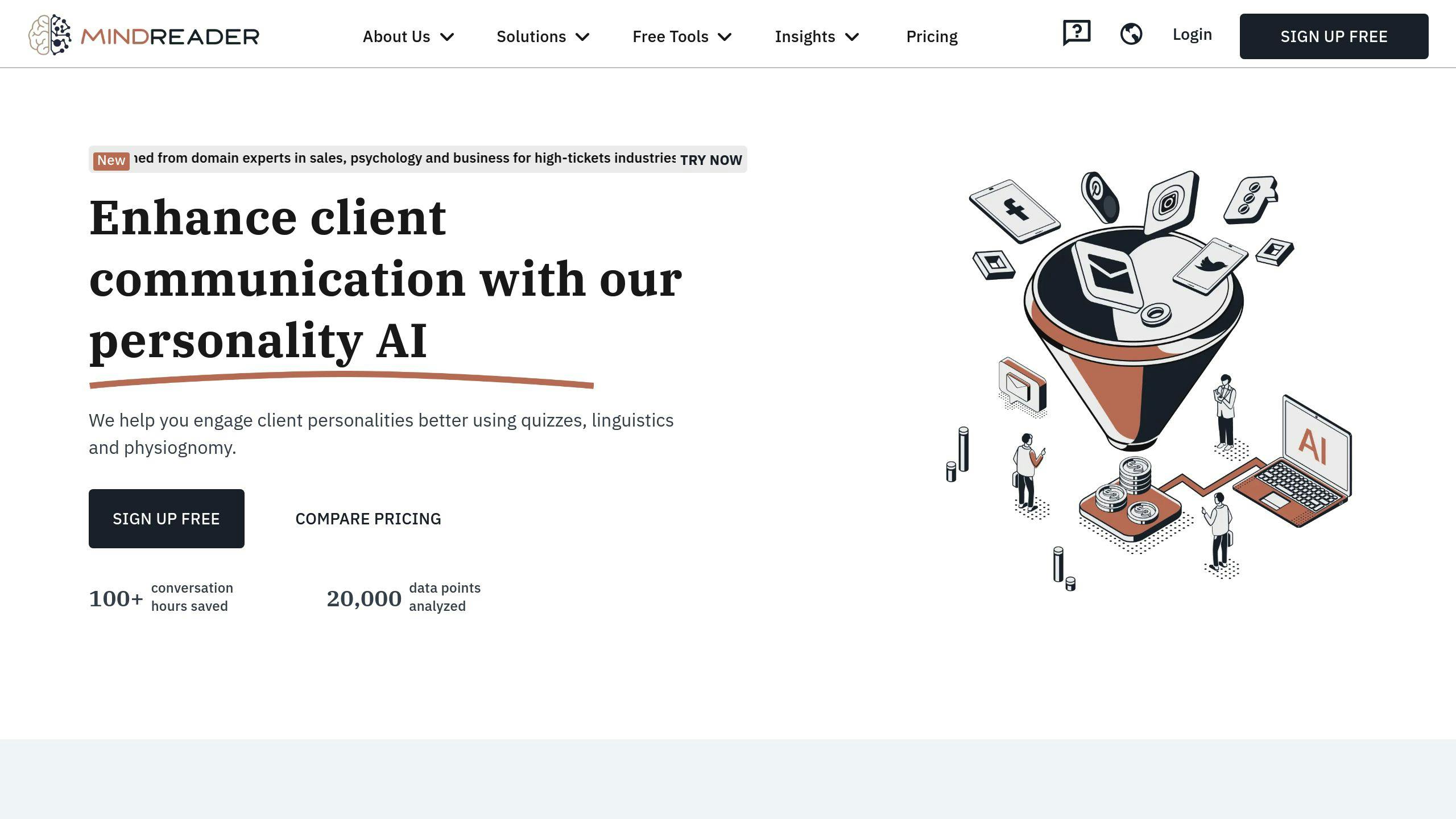Want to boost your sales? Learn to read your clients. Here's how:
- Watch and listen - Pay attention to body language and speaking style
- Notice how they talk - Match their communication style
- Study their decision-making - Analytical or gut-based?
- Spot their motivations - What drives them?
- Match their style - Mirror their approach
- Check them out online - Research their digital presence
- Use AI tools - Leverage technology for insights
Why it matters: Understanding client personalities helps you tailor your approach, leading to better connections and more sales.
Key stats:
Sellers using AI-derived personality insights boost close rates by 6%
Some teams see 20% better close rates with personality analysis tools
Response rates can jump from 15% to 50% with personalized outreach
Popular AI tools:
Humantic AI: Detailed buyer profiles
Crystal: DISC-based communication tips
Mindreader: Real-time facial and text analysis
Remember: Personality insights are just one tool. Use them to guide your approach, not as a replacement for genuine connection.
Related video from YouTube
What is Personality-Based Selling?
Personality-based selling is a smart way to sell by understanding how your clients think and act. It's all about tweaking your sales approach to match each client's unique style.
Basic Concepts
Here's what personality-based selling is all about:
- Figure out your client's personality
- Talk to them in a way they like
- Show them how your product solves their specific problems
Not everyone thinks the same way. By changing how you sell, you can make each client feel like you really get them.
How AI Helps Read Personalities
AI has changed the game in understanding clients. Take Mindreader, for example. It uses fancy tech to look at faces and text, giving you quick insights into a client's personality.
Mindreader's Sales Smart chatbot can tell if a client is a Knight, Explorer, Healer, or Wizard. Knowing this helps salespeople adjust their approach on the spot, making it more likely to hit the mark.
Why It Works
People love feeling understood. That's why personality-based selling works so well. When you tailor your approach, you:
- Connect faster
- Build trust
- Communicate better
- Avoid misunderstandings
Dave Mattson from Sandler puts it this way: "Most sellers naturally click with 25% of buyers. The trick is figuring out the other 75% who think differently. Humantic AI makes that possible."
Sales Tools and Personality Insights
Today's sales tools are pretty smart. They can tell you a lot about customer personalities. For example, Humantic AI's Personality Prediction AI works with platforms like Salesforce to give you the scoop on how customers think and what they like.
These tools make a big difference. Mohammed Aaser at Domo says, "My sellers who use Humantic AI close 20% more deals."
Jevan Fox from AE Studio adds, "Humantic AI has been a game-changer for us. Our response rates jumped from 15% to 50% - that's huge!"
Tools for Reading Client Personalities
Want to boost your sales? Understanding your clients is key. Let's look at some tools that'll help you crack the code of your prospects' personalities.
Basic Methods
Before we jump into fancy AI stuff, let's nail down the basics:
DISC Assessment This tool splits personalities into four types: Dominance, Influence, Steadiness, and Compliance. Watch how your client talks and acts, and you'll quickly figure out their DISC profile. Then you can tailor your approach to match.
Active Listening Pay attention to what your client says and how they say it. Their words, tone, and body language can tell you a lot about who they are and how they make decisions.
Mirroring Technique Tom Niesen from Sales Made Easy puts it simply: "It's like being a mirror. Approach him by how he communicates with you." This trick helps you connect with all sorts of personalities.
AI Tools for Personality Analysis
AI has changed the game when it comes to understanding clients. Here are some cool tools that'll give you an edge:
- Crystal This AI tool uses DISC to guess a prospect's personality based on their online presence. It tells you how they make decisions and like to communicate, so you can craft the perfect outreach strategy.
- Humantic AI This Buyer Intelligence platform uses AI to create detailed buyer profiles. Mohammed Aaser, Chief Data Officer at Domo, says: "Sellers in my team who actively use Humantic AI see 20% better close rates."
- Mindreader This software analyzes faces and text in real-time during sales calls, giving you instant insights into your client's personality.
How Mindreader Works

Mindreader has a unique way of figuring out personalities:
1. Data Collection
It gathers info from your client's face or text.
2. Psychometric Profiling
Using its own system, Mindreader sorts clients into four types: Knight, Explorer, Healer, or Wizard.
3. Tailored Insights
Once it knows the personality type, Mindreader gives you specific tips on how to communicate and persuade.
Live Analysis Features
Mindreader's standout feature is its real-time analysis during live chats. This lets sales pros:
- Switch up their communication style on the spot
- See objections coming before they happen
- Focus on product features that match the client's personality
7 Ways to Read Client Personalities
Want to boost your sales? Learn to read your clients. Here are seven ways to do it:
1. Watch and Listen
Keep your eyes and ears open. Your client's body language and speaking style can tell you a lot.
Are they making eye contact? They're probably interested. Looking away? They might be uncomfortable.
Here's a neat trick: check their pupils. If they're bigger than usual, your client might be really into what you're saying (or worried about it).
2. Notice How They Talk
Some clients get straight to the point. Others love to chat.
If your client uses short sentences, do the same. If they're all about small talk, don't jump into business right away.
3. Study Their Decision-Making
Does your client make snap decisions? Or do they want to crunch numbers first?
If they ask for lots of data, give it to them. Load up on facts and figures for these analytical types.
4. Spot Their Motivations
What makes your client tick? Is it being cutting-edge? Saving money? Playing it safe?
If they keep talking about beating the competition, show them how your product can help them do just that.
5. Match Their Style
Try to communicate like your client does. It's called mirroring, and it works.
As Tom Niesen from Sales Made Easy says: "It's like being a mirror. Approach him by how he communicates with you."
6. Check Them Out Online
Your client's online presence can tell you a lot. Check out their social media, company website, and any articles they've written.
Do they share a lot of industry articles on LinkedIn? They might love talking shop during meetings.
7. Use AI Tools
AI can help you understand your clients better. Here are some tools to try:
"Sellers in my team who actively use Humantic AI see 20% better close rates." - Mohammed Aaser, Chief Data Officer at Domo
- Humantic AI: Gives you detailed buyer profiles.
- Crystal: Offers communication tips based on personality types. Users report a 68% increase in outbound response rates and a 31% boost in lead conversions.
- Mindreader: Analyzes facial expressions and text during sales calls in real-time.
Getting Started
Let's jump into how you can use personality analysis to boost your sales.
Setup Steps
Adding personality analysis to your sales process is straightforward:
- Pick a personality assessment tool. DISC is popular, grouping people into Dominant, Influential, Steady, and Conscientious types.
- Connect the assessment to your CRM. Tools like Crystal can plug right into Salesforce.
- Test it with a small client group first. This helps you work out any issues.
- Get feedback from your team and clients. Use it to make your approach better.
Picking the Right Tools
Choosing a tool can be tricky. Here's what to look for:
- Does it work well with your current systems?
- Is it backed by science and good reviews?
- Do you need real-time analysis or just basic profiles?
Some top tools include:
- Crystal: Uses DISC and works with LinkedIn
- Humantic AI: Gives detailed buyer profiles
- Mindreader: Analyzes calls in real-time
Teaching Your Team
Getting your team on board is key:
- Explain why personality analysis matters in sales.
- Let your team practice with the tools.
- Do role-plays to apply the new skills.
- Keep learning. Share success stories and new insights often.
Measuring Results
Track these to see if personality analysis is helping:
- Are more leads becoming customers?
- Are you closing bigger deals?
- Are your clients happier?
Mohammed Aaser, Chief Data Officer at Domo, says:
Sellers in my team who actively use Humantic AI see 20% better close rates.
Problems and Fixes
Even the best tools and strategies can hit snags. Let's look at common issues with personality-based selling and how to fix them.
Reading Mistakes
Misreading a client's personality? That's a fast track to lost sales. Here's how to avoid it:
Don't jump to conclusions. First impressions can be misleading. Take time to observe and listen.
Remember, context matters. A client's behavior might be more about their situation than their personality. Look at the bigger picture.
And those AI tools like Mindreader? They're helpful, but they're not perfect. Use them as a guide, not gospel.
Want to get better at reading people? Try these:
- Listen more, talk less
- Ask questions that get people talking
- Compare what you see with what the AI tells you
Tool Limits
AI personality tools are cool, but they're not magic. They have limits:
Garbage in, garbage out. If your CRM data is a mess, your AI insights will be too.
Many of these tools have a Western bias. They might misread clients from different cultures.
And some salespeople trust AI too much. They ignore their gut feelings.
How to work around these issues?
Keep your CRM data clean. Use AI insights as a starting point, not the final word. And mix AI tools with old-school personality tests like DISC.
Change Issues
Switching to personality-based selling isn't always smooth sailing. You might run into:
Team pushback. Some folks might think it's unnecessary or creepy.
Patchy adoption. If only some of the team uses the new approach, it can get confusing.
Personality tunnel vision. Some reps might focus too much on personality and forget other important stuff.
To make the switch easier:
Train your team well. Share success stories to get people excited. And remind everyone that personality insights are just one tool in the box.
Making It Better
Want to get better at personality analysis? It's an ongoing process. Here's how:
Keep learning. Stay up to date on personality psychology and sales techniques.
Ask for feedback. Find out what your clients think about their experience.
Share with your team. Set up a system to swap insights and tips.
And don't be afraid to experiment. What works for one personality type might bomb with another. Keep trying new things and track what works.
Conclusion
Knowing your client's personality can make or break a sale. It's not just a nice-to-have - it's a must-have tool in your sales toolkit. Here's what you need to remember:
Personality-based selling isn't just hype. It works. Winmo found that salespeople using AI personality insights close 6% more deals. That's a big deal in the cutthroat world of sales.
AI is changing the game. Tools like Mindreader and Humantic AI give you real-time personality insights. They look at everything from facial expressions to online behavior, helping you tweak your pitch on the spot.
One size doesn't fit all. Whether you're talking to a Driver, Amiable, Analytical, or Expressive type, you need to speak their language. Drivers want results, fast. Analyticals crave data. Knowing this stuff matters.
It's all about connecting. As Humantic AI puts it, understanding your buyer's personality is like "deal insurance." You're not just pushing a product - you're solving problems and building relationships.
The numbers don't lie. When sales reps personalize everything from subject lines to tone, response rates can jump from 15% to 50%. That's the power of getting personal in your sales approach.




